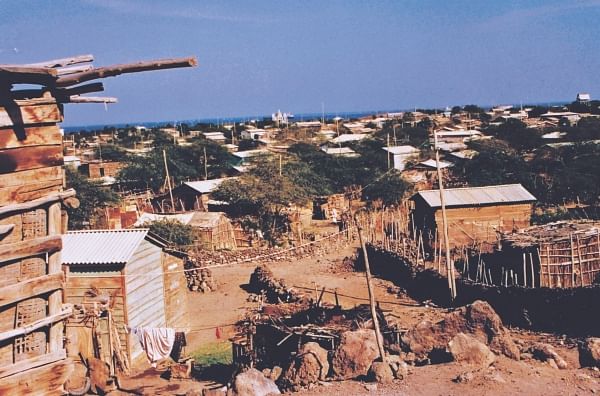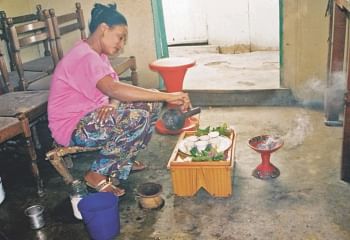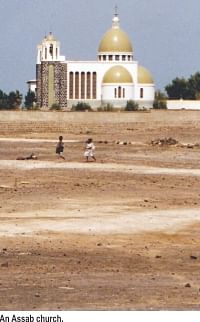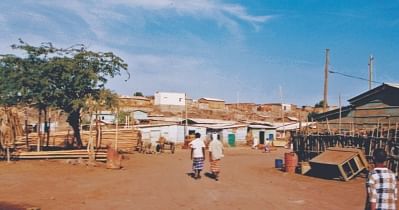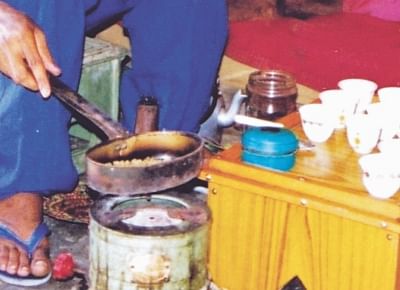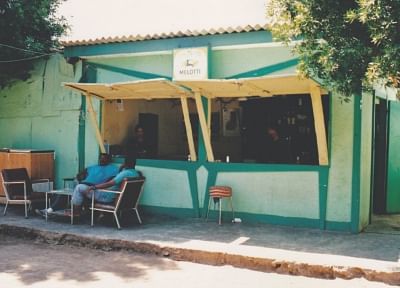| Home - Back Issues - The Team - Contact Us |
 |
| Volume 11 |Issue 50| December 21, 2012 | |
|
|
Reflections
We Met Over Coffee Andrew Eagle
We met amidst the unwashed dishes in an Eritrean sink, in the aqua-coloured shed beside the yard. It was siesta and the corrugated metal gates were shut. Between the trees was only mud, from people constantly shuffling about, but nobody shuffled during siesta. Tables were well spaced and the continuation of mud became a dance floor in the evenings. It's the dishes that made friendship, when I picked up whatever cloth and began to rinse them. She was older, tall and gracious. But perhaps Astor's life wasn't easy. We met in the heady days in the lead up to war. No doubt each side was busy stationing guns along the border. There was the new currency, the nacfa, and the Ethiopians didn't like it; they closed the border and for a port town like Assab that meant a lot. The Ethiopians must've wagered they could rely on Djibouti for sea access.
We met amidst the Coca Cola shortage. I'm unsure if all of Eritrea's cola was shipped in trucks from Ethiopia to be paid for, until the launch of the nacfa, in Ethiopian birr, but in Assab it was so. We met because Astor's restaurant still had some. We met when I was stranded, having arrived by plane from Asmara several hundred kilometres to the north. Assab is in the far south, where Eritrea's Red Sea dog leg finally ends at the Djiboutian border. It's an alien landscape. From the plane I saw massive blackened hulks of volcanoes among the thorny, coastal scrubland. It's the land of Afars tribes and beaches of blond sand where the Red Sea glimmers off towards Yemen. I had no return ticket. I planned to spend days in a jeep on the coast road to reach the old Ottoman port of Massawa. It would've been a journey of camping, negotiating the way with the Afars and hoping not to meet bandits. But the night sky surely would've been radiant. There was no public jeep but I held hope of hitching with a convoy. People said it was the UN trucks that plied the route. I asked around. There wasn't anything going.
I might've continued to Djibouti but I had no visa and the Ethiopian consulate couldn't issue one so the road to Addis, besides the closed border, also wasn't an option. Still, the consular officials had showed the cover of an Ethiopian magazine with a picture of their president on it and a headline that called him a thief. 'We have free media in Ethiopia,' they said. 'If I decided to live there, would you give citizenship?' Yes, he said, after a few years they would. But it didn't solve the lack of transport problem.
At the airline office was a problem. 'Sir, we have no seat available for at least a week.' It left me in the midst of the cola shortage on a standby list. It led me to Astor. We met because of Emmanuel. Along with Sammy he was a waiter at Astor's and he'd come to the hotel reception on some errand. He overheard me asking after Coca Cola. 'We have some,' he said. It all sounded convenient and I was wary as I followed him over the road. But it was true. I'm sure about that because I drank one. 'Where are the customers?' I asked. 'We're closed in the middle of the day.' But I was welcome to stay because Astor had a coffee making habit.
We met over coffee and in Eritrea there's ceremony about it that starts with smoking coals. Astor was crouching, tending the fire. Sammy was there with the cook. Starting with the green beans in a pan Astor began roasting them. We chatted as we could in English, and coffee-smoke began wafting from the pan. She held the pan towards each in turn. As the pan came I imitated, waving hands about guiding coffee-smoke towards my nostrils like an insane conductor conducting his orchestra. To breathe in the smoke and smell the fresh coffee was a blessing. Coffee is made in rounded clay pots with a long straight spout and clay handle. They look art deco. As the base is rounded a pot holder is required, shaped like an hourglass but larger and brightly painted in designs of African geometry. In the pot with water the coffee became a brew, the spout stuffed shut with straw to let the coffee draw. The cups were tiny and round, the coffee black and strong. There were numbers: one cup but not two, three or seven but not four, although the allowable tallies and those that would bring bad luck I don't recall. Emmanuel had once been a ship hand and he'd travelled far. 'New Zealand is the best country,' he said, 'I should've stayed in Auckland.' The first afternoon customers were banging on the closed gate. Emmanuel let them in and began taking orders. And there were dirty dishes. They were surprised to see me work; so was I. It's not that I couldn't have met them later: maybe it was Astor or perhaps the coffee ceremony, but shortly I was waiting tables too. Fortunately the menu was brief and wholly oral so the few dishes ordered in Tigrigna I could remember in telling the cook. After some time Astor hurried over, worried. 'I can't pay you,' she said. It made me laugh. But in shared meals over the four days they did pay me in a way. I enjoyed the spicy goat dish. My shifts were timed between beach visit and town seeing and in the evenings when the dance floor came alive I relaxed at a table under a tree. There was another payment, of the sort no amount of nacfa can buy: the customer reaction. In Eritrea to gain a waiter's attention customers put their hands up and clap loudly. From a western perspective it seemed a little rude; so on taking food and drinks to the table I'd put them down as the local waiters did but not remove my hands. 'Yekenyelei!' I would say in a stern voice, 'Thank you!' To this gesture the customers without exception repeated, 'Yekenyelei, yekenyelei!' They had a sea of sincerity about them. Customers were surprised by an Australian waiter. There used to be laughter. In the evenings people would clap and when Sammy or Emmanuel went over they'd say, 'No, no, we want the white waiter!' It was novelty. 'He doesn't work the night shift.' On the street I was greeted with a hearty handshake from a gentleman who said, 'I go to Astor's sometimes.' There were many customers. Eritrean Airlines found a seat on whatever plane they'd borrowed and it led to my farewell with Astor in the dog leg of Eritrea's south. While boarding, came another unexpected greeting. It was the Ethiopian consular official on his way to Asmara. I wonder: did he make it back to Assab before the last Coca Cola had been drunk and the war started? In Asmara I bought a coffee pot with a brightly painted stand: because we met over coffee. Photos: Andrew Eagle
|
||||||||||||||||||
|
